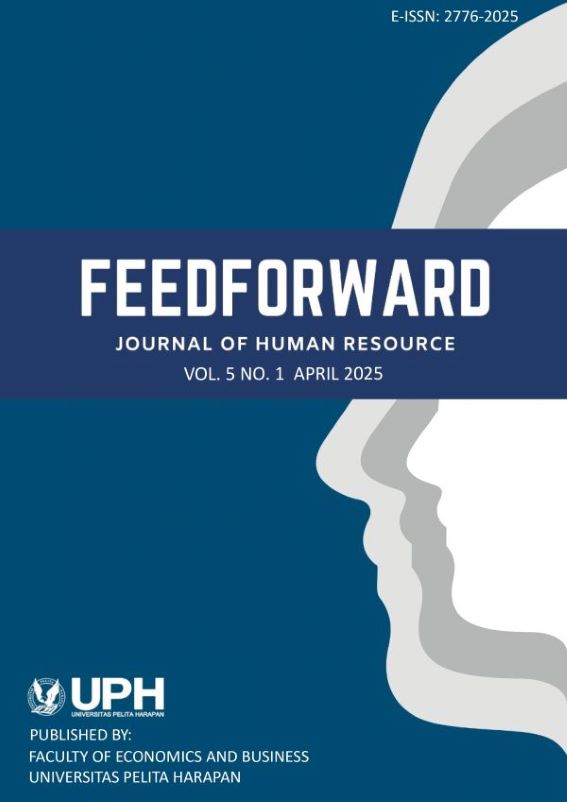MODEL OF CHANGE MANAGEMENT PERFORMANCE IN CITRARAYA PARISH THROUGH THE LEADERSHIP ROLE OF THE PARISH PRIESTS
##plugins.pubIds.doi.readerDisplayName##:
https://doi.org/10.19166/ff.v5i1.9588关键词:
Change Management, Citra Raya Parish, Model, Parish Priest Leadership, Performance, Personal Quality摘要
Change management in religious organizations, such as parishes, requires an effective management model so that it can run well and sustainably. The lack of consideration of personal quality factors and leadership of parish priests is a major problem in realizing better change management performance. This study is intended to initiate a change management performance model in Citra Raya Parish through the leadership role of the parish priest. This study uses an empirical research method with a quantitative approach, with a case study in Citra Raya Parish. Valid data was collected from 100 parishioners through an online empirical survey, using a purposive random sampling technique. The results of the study show that the effectiveness of change management performance in the parish environment was influenced by the role of the pastor's leadership style and the personal qualities he possesses. Theoretically, these results contribute significantly to the existing literature, in line with the understanding that good leadership and personal qualities impact the ability to overcome management changes in an organization in this case study in a religious organization. The performance model of change management in Citra Raya Parish produced in this study has significant benefits and can contribute to being a reference for other churches in managing change more systematically and sustainably.
参考
Aisah, S., Okfrima, R., & Anggawira, A. (2024). Hubungan moral integrity dengan academic dishonesty pada siswa kelas VII & VIII MTsN 4 Kota Padang. Indonesian Research Journal on Education, 4(2), 924–930. https://doi.org/10.31004/irje.v4i2.811
Asikhia, O., Nneji, N. E., Olafenwa, A., & Owoeye, O. A. (2021). Change management and organizational performance: A review of literature. International Journal of Advances in Engineering and Management, 3, 67–79.
https://doi.org/10.35629/5252-03056779
Bili, M., Indradewa, R., & Anindita, R. (2022). The pastoral ministry quality model for spiritual well - being : A mixed - method research. American Internatinal Journal of Business Management, 3(1), 1–17.
Chowdhury, A., & Shil, N. C. (2022). Understanding change management in organizational context: revisiting literature. Management and Entrepreneurship: Trends of Development, 1(19), 28–43. http://dx.doi.org/10.26661/2522-1566/2022-1/19-03
Deepaware, N., Agrawal, A. K., Divakaran, P., & Khalid, S. (2023). Practice of change management and its impact on performance of companies. Samdarshi, 16(1), 984–987.
KAJ. (2019). Pedoman dasar dewan paroki keuskupan agung Jakarta. Jakarta, Indonesia: Keuskupan Agung Jakarta.
Manoranjitham., Charles, M. V. S., Gnanapragasam, A., & Sony, A. (2024). Empathy and nursing. International Journal of Science and Research Archive, 11(2), 93–96. https://doi.org/10.30574/ijsra.2024.11.2.0324
Mccrobie, L. (2019). Leadership perceptions among catholic priests: A study of leadership style within the roman catholic church. Lambert Academy Publishing.
Muna, A. N. (2022). Examining the importance of leadership skills in todays life. International Journal of Social Service and Research, 2(10), 977–982. http://dx.doi.org/10.46799/ijssr.v2i10.185
Nadmilail, A. I., Matore, M. E. E. M., & Maat, S. M. (2024). A kick-start to explore the concept of personal quality. Muallim Journal of Social Science and Humanities, 8(2), 85–92. http://dx.doi.org/10.33306/mjssh/277
Pandego, H. I., Purba, A., & Marmidi, F. X. (2025). The leadership of priests in the light of canon 255 the 1983 code. Logos: Jurnal Filsafat dan Teologi, 22(1), 35–46. https://ejournal.ust.ac.id/index.php/LOGOS/article/view/4473
Philip, T. K. (2022). The impact of change management on church leadership due to COVID-19: a phenomenological study [Undergraduate Disertation: Northcentral University]. https://www.proquest.com/openview/86bf11249787ec709be5064c07fd6357/1?cbl=18750&diss=y&pq-origsite=gscholar
Plaw, C. Y. (2023). A step-by-step guide PLS-SEM data analysis using SmartPLS4. Researchtree Education.
Pratiwi, S. I., & Soetjiningsih, C. H. (2024). Patience with final year students’ academic stress at Universitas Kristen Satya Wacana. Gema Wiralodra, 15(1), 419–425. http://dx.doi.org/10.31943/gw.v15i1.675
Purnomo, S. H., & Wibowo, D. A. (2021). The influence of the leadership and character of a pastor on the spiritual growth of the congregation at the GPDI Alfa Omega Church. Journal Didaskalia, 4(2), 8–18. https://doi.org/10.33856/didaskalia.v4i2.215
Shyamala, M. (2024). Change management and organizational change. International Journal of Business and Management Invention, 13(4), 122–125. https://doi.org/10.35629/8028-1304122125
Sumaiya, B., Srivastava, S., Jain, V., & Prakash, V. (2022). The role of effective communication skills in professional life. World Journal of English Language, 12(3), 134–140. http://dx.doi.org/10.5430/wjel.v12n3p134
Tampubolon, M. P. (2020). Change management manajemen perubahan : Individu, tim kerja organisasi. Indonesia, Bogor: Mitra Wacana Media.
##submission.downloads##
已出版
期
栏目
##submission.license##
##submission.copyrightStatement##
##submission.license.cc.by-sa4.footer##Authors who publish with this journal agree to the following terms:
1) Authors retain copyright and grant the journal right of first publication with the work simultaneously licensed under a Creative Commons Attribution License (CC-BY-SA 4.0) that allows others to share the work with an acknowledgement of the work's authorship and initial publication in this journal.
2) Authors are able to enter into separate, additional contractual arrangements for the non-exclusive distribution of the journal's published version of the work (e.g., post it to an institutional repository or publish it in a book), with an acknowledgement of its initial publication in this journal.
3) Authors are permitted and encouraged to post their work online (e.g., in institutional repositories or on their website). The final published PDF should be used and bibliographic details that credit the publication in this journal should be included.


